Andrii,* 13, dreams of becoming a famous actor playing a smart detective. Back home in Ukraine, he regularly attended a theatre studio. But since fleeing the conflict with his mum, leaving behind his father and grandparents, he has had to get used to life in Warsaw.
One thing that has helped is school – but not just any school. Andrii goes to the ‘Unbreakable Ukraine’ school for refugees where pupils are taught the Ukrainian syllabus by teachers who have also fled the conflict.
The mood in the school, based in a busy shopping centre, is infectiously positive. “The school is very interesting, I have never seen anything like this before,” said Andrii in November 2022. “At the end of the day, we leave the class and go home in a good mood.”
His motto, he said, is ‘stay kind and positive.’ “Thank you very much for making this school,” he added. “It’s incredible. I really like it here.”
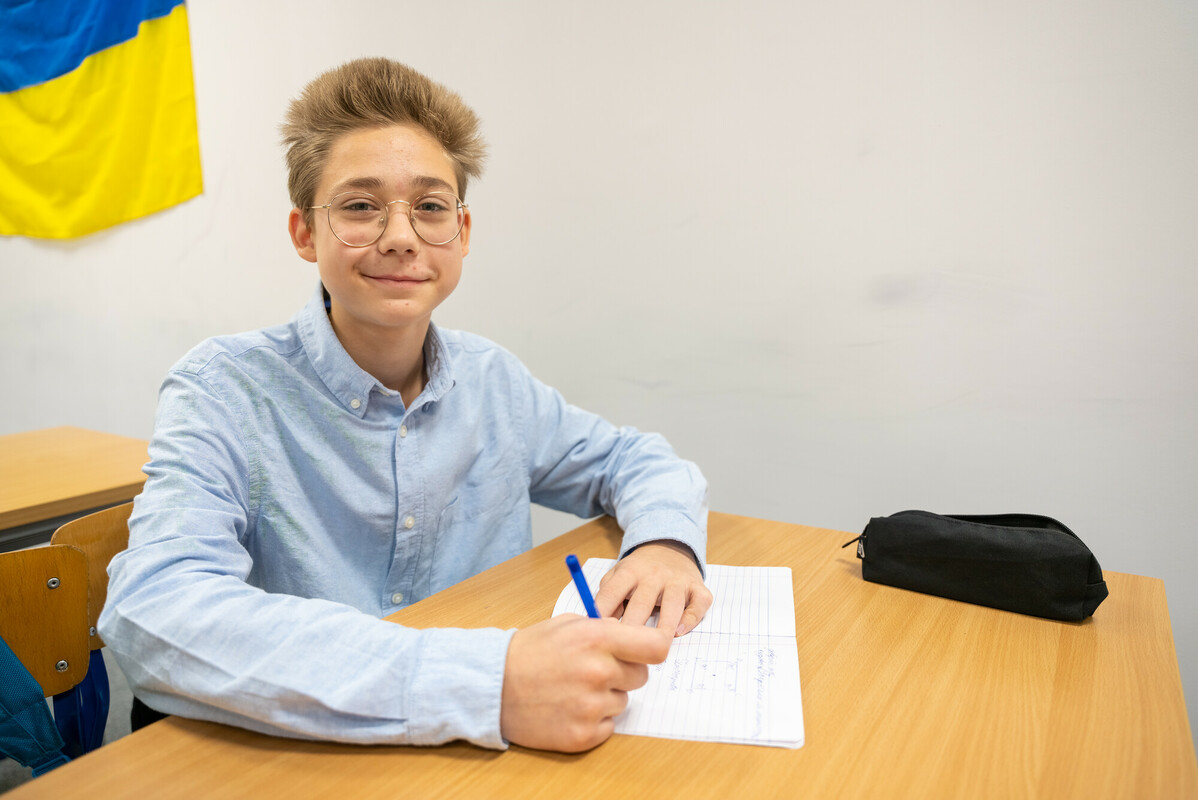
The school – set up just six weeks after the conflict started – is one of three in Poland which receives funding from the DEC through Save The Children. 2,250 refugee children attend the three schools, in Warsaw, Krakow and Wroclaw, but there were more than 7,000 applications. Following the Ukrainian syllabus provides crucial continuity for families, many of whom hope one day to return to their homes.
“A lot of parents said that the advantage of our school is that it’s offline,” said head teacher Victoria. “Children forget how to communicate. For the last two years they have been studying online because of Covid situation and then conflict. Being together, doing something together is a form of psychological support for them. Communicating, doing some crafts, studying offline makes them forget everything bad that happened before.” Watch a brief tour of the school from Yevheniia*, another student below.
By the end of the summer of 2022, six months on from the start of the conflict, many of the 1.4 million refugees from Ukraine who had stayed in Poland, Romania, Moldova and Hungary were realising that an imminent return home was unlikely and began to enrol their children in local schools for the autumn term. Refugees’ hopes of going home for Christmas were also dashed when bombing of critical infrastructure stepped up in October, making clear that it would be an inhospitable winter in Ukraine. For now, they had to continue their lives as refugees in their new-found homes.
Bianca Albu, Project Manager for the Jesuit Refugee Service (JRS) in Romania, a partner of CAFOD, explains: “Everybody was talking about staying here in Romania temporarily for a few weeks, for a few months, and then going back. They were all hoping that in September, they will go back to Ukraine, have their children going to school, or they are hoping that Christmas will be together with their families. And all their hopes and dreams were, little by little, changed. I don't want to say destroyed.
“[Refugees] started asking more and more for education and Romanian language classes and help finding a job, because now they understand that they need to spend the winter in Romania – that no matter how hard it will be here, it is going to be easier than Ukraine.”
Andreea Furtuna, Director of Programmes at the Romanian Red Cross saw a similar pattern. “Many of them had actually thought that it would end really quickly but after three months, it was obvious that they will be here much longer,” she says. “They also realised that they need to get some roots... and they started to look for language classes, for counselling, for enlisting their kids to schools, they needed things like a place to leave the kids while they are looking for a job or going to pick up the food.”
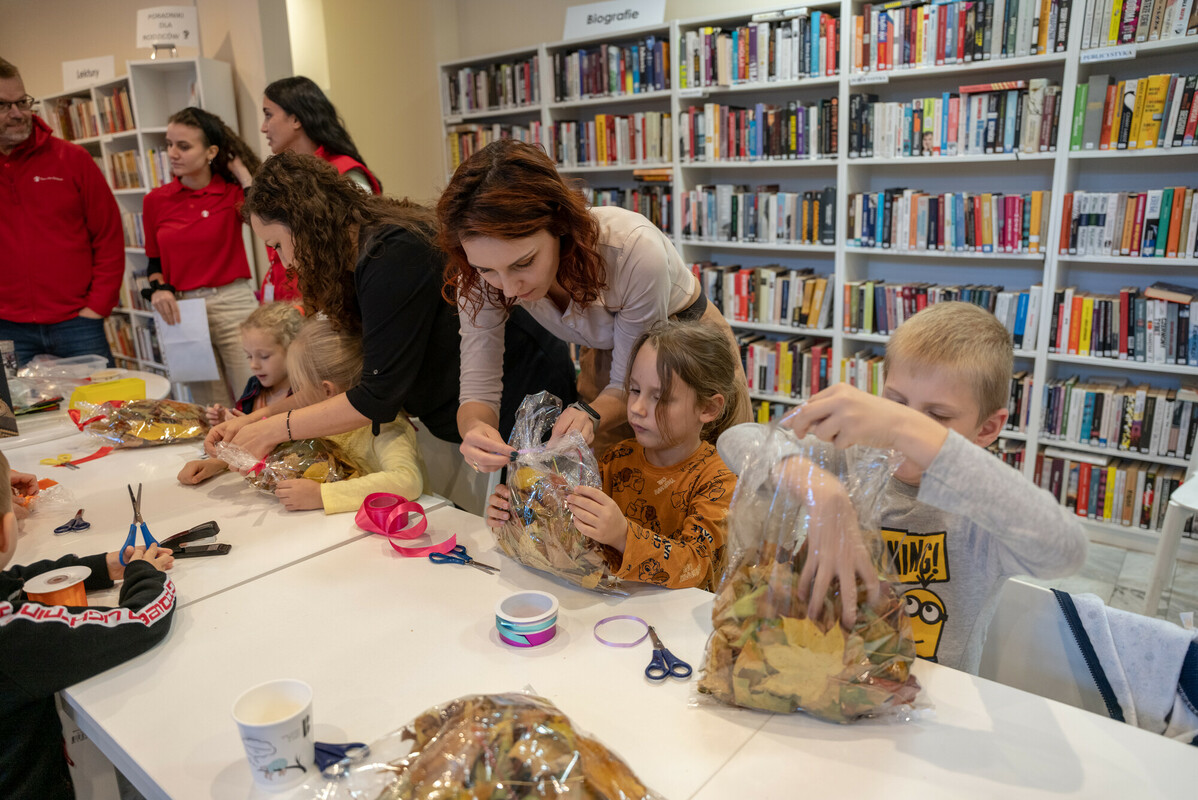
The sudden spike in demand for school places for refugee children, who were beginning schooling in a new language having experienced the trauma of fighting and relocation, put huge pressure on local education services. In Poland, DEC charity Plan International used appeal funds to provide training to almost 3,000 teachers. This included training on how to how to run a multicultural classroom, teaching Polish as a second language and helping teachers to recognise mental health and learning support issues that children might have.
“85% of [teachers] said they were starting the autumn term better prepared to understand what their students are going through and how to help them,” says Suzanne Zuidema, Education in Emergencies Specialist for Plan International in Poland. “Even though only 40% of Ukrainian children in Poland are in Polish schools that's still almost 200,000 children, so it was a real crush on the school system. And 80% of Polish teachers have never had a student in their class who was not a Polish speaker.”
While some DEC charities helped children integrate into local education systems, some parents preferred to have their children studying in Ukrainian schools or remotely. In Romania, DEC funds paid for 150 tablets to allow children to participate in online schooling delivered from inside Ukraine.
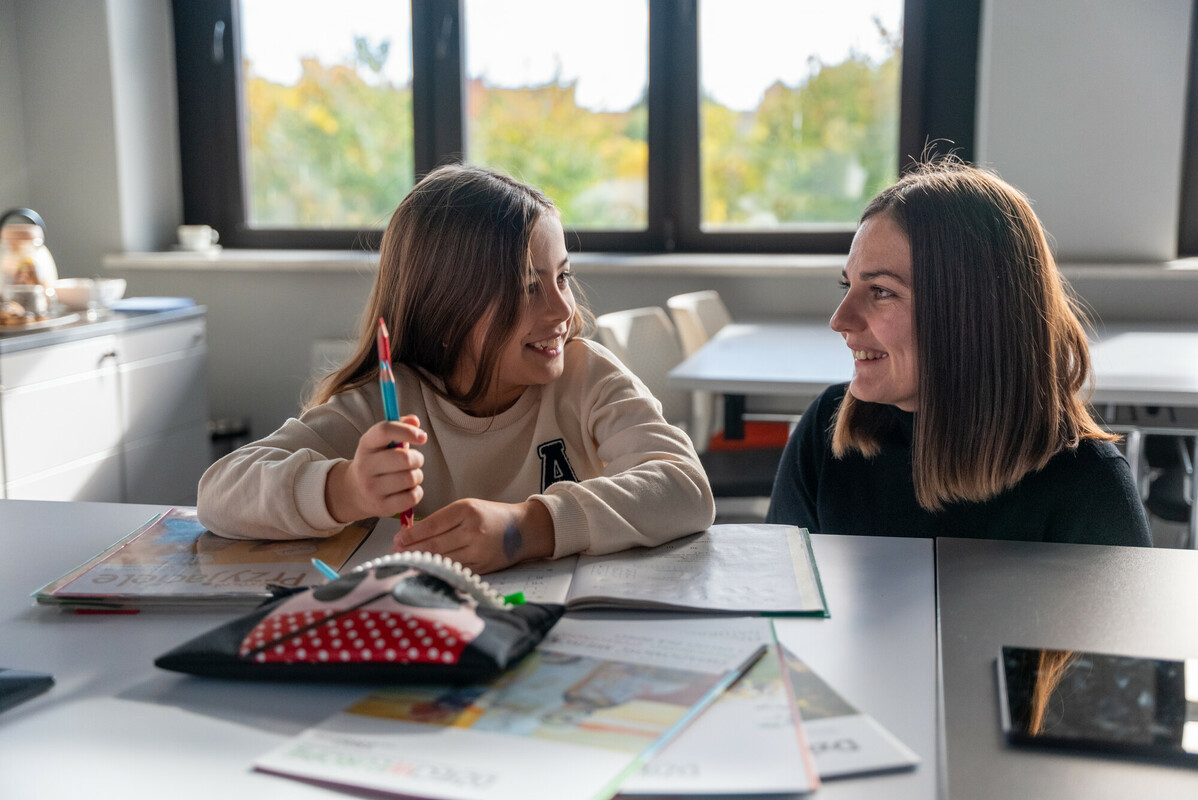
Another Save the Children project in Poland, with local partner FRSI, supported libraries to become safe spaces and digital learning centres for children and their parents. The project funded teaching assistants and tutors from Ukraine as well as essential equipment including computers with Cyrillic keyboards. It also provided training, including Ukrainian language classes, to library staff. Parents and caregivers can access activities such as ‘mum clubs’ and Polish language clubs. By November 2022, 20 library spaces had been established with a further 31 planned across Poland in 2023.
Viktoriia* is a psychologist and teacher working at a library in southern Poland. She’s a refugee herself and says speaking to the children in Ukrainian helps them feel at home. “This is a very good project for children,” she said in November. “When you play with a child, it helps them to open up psychologically, to calm down, to feel at home. We greet each other, they talk to each other about school, what they did and what homework they have to do. And if someone needs help, we sit down together to do their homework.”
Protection projects such as safe spaces and education now form a large part of the work funded by the DEC as part of the regional refugee response. Between September 2022 and August 2023, DEC charities plan to use 24% of aid expenditure outside of Ukraine on protection activities, and 15% on education.
Protection issues remain a major concern, with refugees still extremely vulnerable to exploitation. Aid workers say that cases of gender-based violence and sexual exploitation are on the rise, as well as indicators of labour exploitation. For more information on how DEC charities are addressing protection issues, see Vulnerable Groups.
DEC charities have also been supporting adult refugees to learn local languages and find work and long-term accommodation, often being guided in the type of support they offer by refugee communities themselves. Once immediate needs like hygiene, shelter and money are met says Furtuna of the Romanian Red Cross, “Many of them want to learn the Romanian language and English, and they are also asking for support in finding a job. So, these are part of the integration activities that we are trying to deliver.”
A focus for Save the Children Romania is helping young people find employment. Andrei Craciun, Area Manager says: “We are just starting an evaluation on youth livelihoods to assess the needs and help the teenagers and youth to acquire the necessary skills or competencies for them to be able to access the labour market in Romania.”
CAFOD’s partner JRS has been helping refugees in Romania move into longer-term accommodation. “DEC funds paid for people to become independent and to move to private apartments as early as March where the refugees paid the rent, utility bills and other expenses,” says Bianca Albu of JRS. Appeal funds also went towards one-off payments for furniture and goods.
Not only did this provide people with security and more comfortable living conditions, but it also allowed them to feel more empowered and bring a sense of normalcy during a time of huge uncertainty. Albu says JRS worked with an integration philosophy in mind. “If people are empowered to become independent since the very beginning... this is going to help them move on sooner,” she says.
As many of those arriving had lost everything, including the means to support themselves and their families financially, unconditional cash payments were crucial in giving people the freedom and versatility to prioritise their needs. Cash assistance accounted for 47% of DEC aid expenditure in the first six months of the response, reaching 338,000 people. It is also planned to account for 39% of aid expenditure in the refugee response between September 2022 and August 2023.
Elena and Victor are among those to have benefited from cash payments. The couple fled to Moldova from their home in Ukraine with their eldest grandson in April after the pharmacies ran out of the medication Victor needs. Back home the pensioners had a comfortable life with an apartment and a summer house. Now they are grateful to receive cash vouchers from HelpAge, a partner of DEC charity Age International, to pay for food from local supermarkets.
A real feature of the refugee response in Ukraine’s neighbouring countries has been the willingness of both host communities and refugees themselves to help others.
Many refugees from Ukraine have played a pivotal part in the ongoing humanitarian response: working as translators, in food distribution centres, in anti-trafficking information and support and to help fellow refugees navigate the challenges of life in an unfamiliar country. Many say it has helped them fight the powerlessness of displacement.
“I can’t just stay here and do nothing,” said Lina, a refugee from Kyiv now volunteering with Plan International’s local partner Moldova for Peace. “I feel like I need to help people,” she added, “because if not me and people like me who will help them? Nobody.” Having been helped by volunteers herself when she fled Ukraine in July, Lina decided to volunteer once she arrived in Chisinau. Every Saturday, Lina and other volunteers come to pack food and clothes donations at the Moldova for Peace warehouse and distribute them to refugees. They also help people register as refugees online.
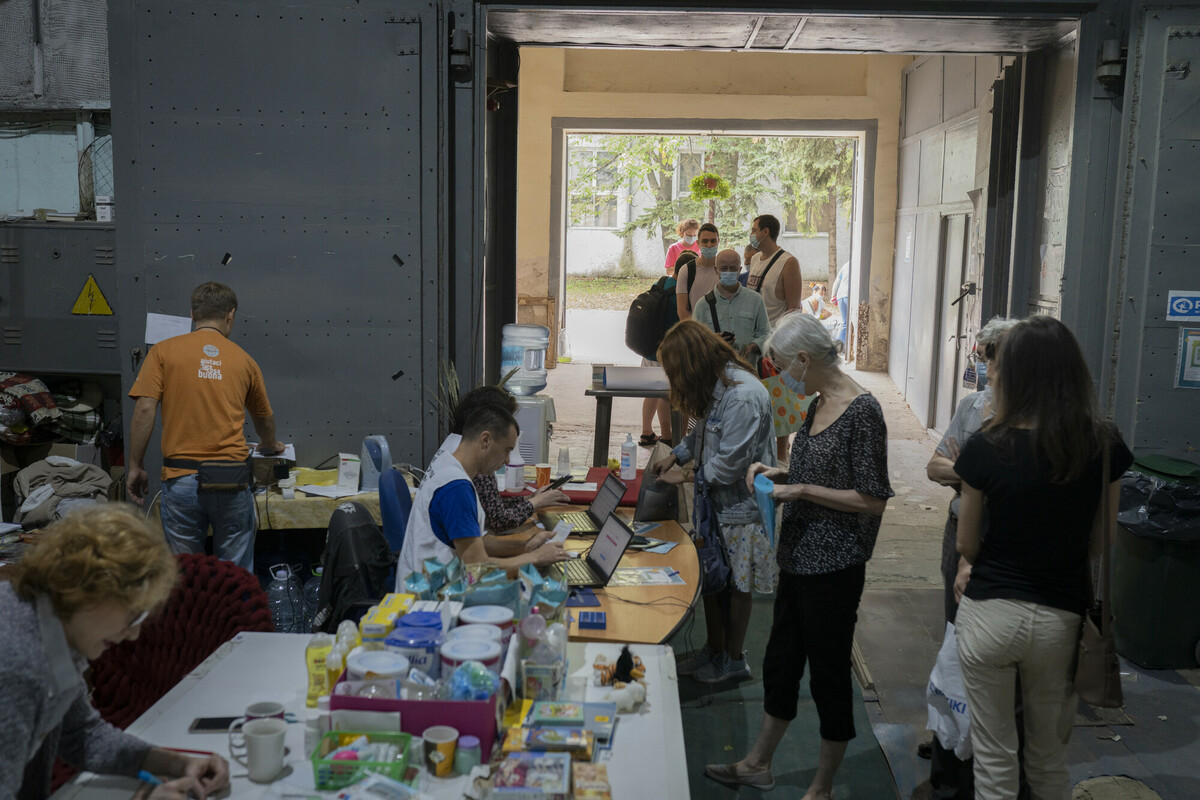
Local families, individuals and businesses across neighbouring countries played a huge role in helping refugees: donating time, money, goods and even their homes to the response. “This response was hugely supported by the majority of the host-country population,” says Suzanne Zuidema of Plan International Poland. “Individual Poles have really stepped up and done a ton of the humanitarian work: providing places for people to live, providing rides, providing interpretation, helping people understand the school process.” In Romania, Andreea Furtuna of Romanian Red Cross, says local support has amplified the charity’s impact: “We’ve had support from the local population because the Romanians are generous when it comes to donating food, helping our work go further.”
But as time has gone on, host communities have felt the consequences of the conflict in Ukraine as well, with electricity and gas bills rising as they have across Europe. In order to provide rounded assistance, DEC charities have started to support local host communities alongside refugees. “Winter is quite rough in both Romania and Moldova and the cost of utilities in particular are very high and increasing every month,” says Eka Zhvania, World Vision Country Response Director for Romania and Moldova. “This is true for the host communities as well as refugees. So, we make sure that the support we are providing – food and non-food items through food banks and cash distributions – is also for host families who are providing accommodation and meals to the refugees.”
While the numbers leaving Ukraine have declined through 2022, newly displaced refugees continue to arrive. The most recent arrivals, having held out as long as possible before making the difficult decision to leave the country, have often lost livelihoods and completely exhausted their savings. They are increasingly vulnerable and desperate, having spent months under shelling and bombardment and watching loved ones suffer.
“The people who came first seemed to have more financial means and places to go,” says Suzanne Zuidema of Plan International Poland. “The people who are coming now seem to have really tried to hold out at home but have just realised it's become untenable, particularly with the onset of winter and the recent escalation in the destruction of infrastructure. Many of these people have been in conflict areas for extended periods of time, so they are coming with more significant mental health and psychosocial support needs.”
Lisa Scharinger, Oxfam’s Interim Country Lead for Poland, agrees: “Refugees who have entered Poland more recently have higher degrees of vulnerability. They often arrive without a clear destination, or they don't have any family or established communities.”
An unusual feature of the refugee crisis is the fluidity of movement over the border, with people crossing back into Ukraine to check on loved ones or property, and then leaving again. “People are coming back and forth through Poland all the time,” says Zuidema of Plan International. “In a lot of crises people leave and they stay gone,” she says.
This can create challenges for aid organisations as the numbers and needs of the community fluctuate. “It's a challenge to track people and understand what the real needs are because the community is constantly changing,” says Zuidema.
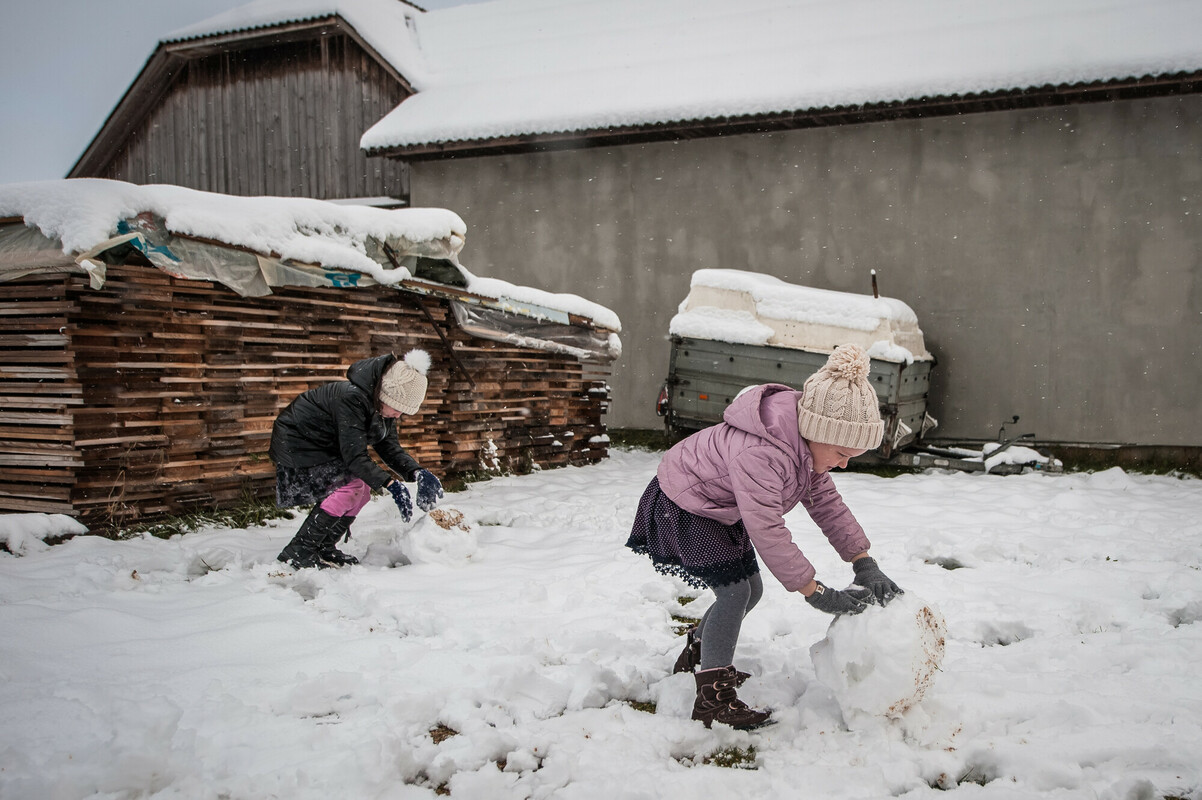
The sustained targeting of Ukraine’s power grid and other infrastructure which started in October may cause more people to flee to neighbouring countries over the often bitterly cold winter.
“We are likely to see more refugees coming due to the increased intensity of the conflict and lack of heat and electricity people in Ukraine are facing as a result,” says Bogdan Simion, of SERA, partner of CARE International in Romania. “The energy crisis across the whole of Europe, including Romania, will also mean it will be more expensive to support the refugees in terms of covering costs of shelter and heating and electricity there and providing food.
“We are trying to think about how we will support people’s increasing financial needs and other immediate needs like warm clothing and food. We are prepared, but you never know how many people will arrive, and that's the whole problem.”
As we near one year since the start of the conflict, with no end in sight, refugees and the aid organisations supporting them face mounting challenges: a global energy crisis, soaring inflation, risks related to winter, and waning economic and emotional support within host countries. Longer-term sustained support will be critical.
“For the moment we know that the conflict is far from being over,” says Simion. “With every increase of intensity in this conflict, we see an increase of the number of people who are arriving in Romania. The longer the conflict stays alive and increases in intensity, the poorer and poorer the people coming here are, which means they will need more resources to be supported and it will be harder to integrate them. So, all of the humanitarian community needs to remain alert and keep the momentum of the intervention at the same level.”